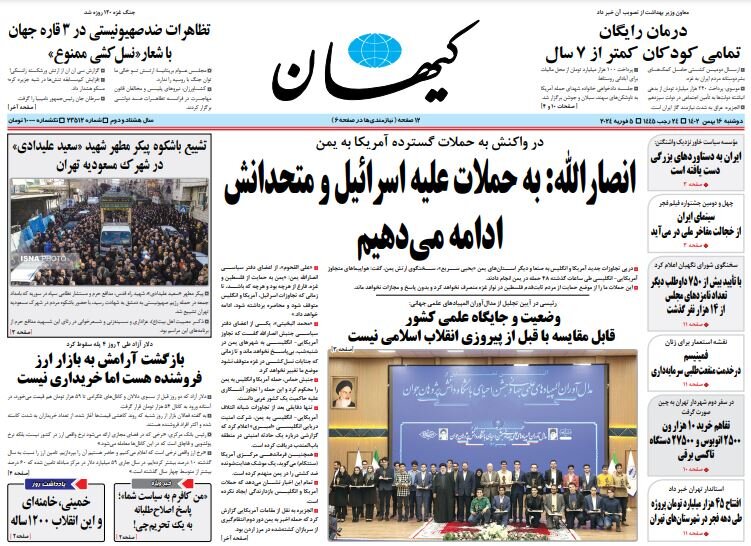Iran's power in the region

TEHRAN - In an analysis, Kayhan discussed the recent dramatic attacks of the United States and wrote: During the last four months, the developments process showed that the Americans came to the conclusion that they have to recognize Iran and the axis of resistance as official effective actors in the regional order, and there are many indicators for this matter.
However, the operation that happened on Friday night and "apparently, it was done with prior notification both officially and unofficially", indicates that the Americans have recognized the axis of resistance and specifically the Islamic Republic of Iran as an equal actor and want to consider the interests of the Islamic Republic from now on. America is gradually accepting Iran's acting power as an effective regional and possibly effective power in the world order, and in fact, we will witness the emergence of a new round of relations between Iran and the great powers in the region.
Etemad: America's mistake
In a note, Etemad discussed the escalation of conflicts in the Middle East and said: America made a mistake again and put the policy of extreme militarism for the hegemonic order on the agenda, like the pattern of the past two decades. America's goal of bombing and missile attacks on more than 85 targets has been declared as a revenge, military power, and destruction of the offensive facilities of the resistance groups. But the main goal is to weaken Iran's capabilities, unsettle the balance in the region in favor of America, Israel, and its allies, and take revenge on Iran due to the deadlock conditions in Gaza, without even a strong reaction or a direct war with Iran. But America will never succeed even by disturbing the balance of the region with military pressure on Iran. All previous U.S. military actions in the region in Iraq, Syria, and Afghanistan have shaped the balance to the detriment of America rather than to the benefit of America. From the totality of what happened behind the scenes to control the level of tensions and the public signals that were exchanged, the result was that we are witnessing the move to avoid direct conflict with Tehran and engage in large-scale, yet controlled, conflicts with Iran-related groups.
Vatan-e-Emrooz: deterrence or crisis?
In a commentary, Vatan-e-Emrooz discussed the actions of the United States in the Middle East with the aim of establishing deterrence and said: It seems that the recent attacks do not have the necessary deterrent power to save the White House from the intentional crisis in West Asia. All the military and diplomatic calculations of the Biden administration after the unprecedented attack on the country's military base in Jordan were based on the idea of being able to create a balance between deterrence and avoiding the spread of tension and the escalation of the crisis. According to the New York Times, these attacks could escalate tensions in the region, and military action will never provide a long-term deterrence. The Americans believe that the negotiation has been more fruitful. Attacks on U.S. bases in Iraq and Syria were significantly reduced when Washington and Tehran negotiated last year, through indirect talks by the mediation of Oman and Qatar, to release $6 billion in frozen Iranian oil revenue in exchange for a prisoner exchange. Iran and the forces supported by it have now emphasized that if a permanent ceasefire is achieved in Gaza, the situation will calm down again.
Leave a Comment